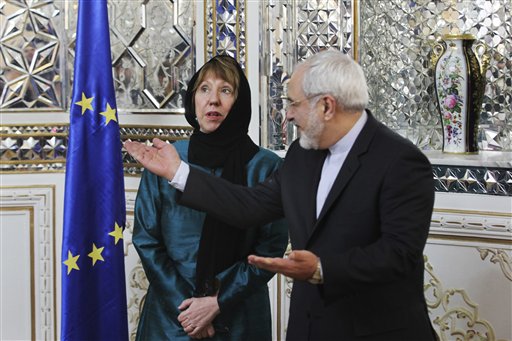EU’s Ashton: No guaranteed success in Iran deal

Iranian Foreign Minister Mohammad Javad Zarif, right, welcomes European Union’s foreign policy chief Catherine Ashton for their meeting, in Tehran, Iran, Sunday, March 9, 2014. AP
TEHRAN, Iran—The European Union’s foreign policy chief said Sunday that there is “no guarantee” that nuclear negotiations between Iran and world powers will reach a final deal.
Catherine Ashton was in Tehran on Sunday for meetings with Iranian officials on ongoing negotiations over the country’s nuclear program, as well as the civil war in Syria and other issues. She spoke to reporters in a joint briefing with Iran’s foreign minister Mohammad Javad Zarif.
Under an interim deal in November, Iran agreed to limit a key nuclear activity, uranium enrichment, in return for easing sanctions by the West.
Negotiations for a final deal are ongoing. Ashton leads the six-nation group—the United States, Britain, France, Russia, China and Germany—in talks with Iran.
“I think this interim agreement is really important, but not as important as the comprehensive agreement that we are currently engaged in. Difficult, challenging, there’s no guarantee we’ll succeed,” she said.
Article continues after this advertisementZarif said Iran will only accept a deal that respects its “rights,” a reference to uranium enrichment on its soil, while reiterating Iran’s longstanding position that his country is not pursuing nuclear arms.
Article continues after this advertisement“Iran will only accept a solution that is respectful, that respects the rights of the Iranian people,” he said.
“At the same time Iran finds it in its own interest to make sure that there are no ambiguities about Iran’s intentions, because we have no intention to seek nuclear weapons.”
The two said they had also discussed fighting terrorism, drug trafficking, and conflicts in Afghanistan and Syria. Iran is a key ally of Syrian President Bashar Assad.
Under the historic deal, Iran agreed to halt its 20 percent enrichment program, but will continue enrichment up to five percent. It also will convert half of its stockpile of 20 percent enriched uranium to oxide, and dilute the remaining half to five percent. Enrichment to 20 percent is a possible pathway to nuclear arms.
The West suspects Iran’s nuclear program has a military dimension. Iran denies the charge, saying its nuclear activities are aimed at peaceful purposes like power generation and medical treatment.
RELATED STORIES
Iran prepares for start of landmark nuclear deal